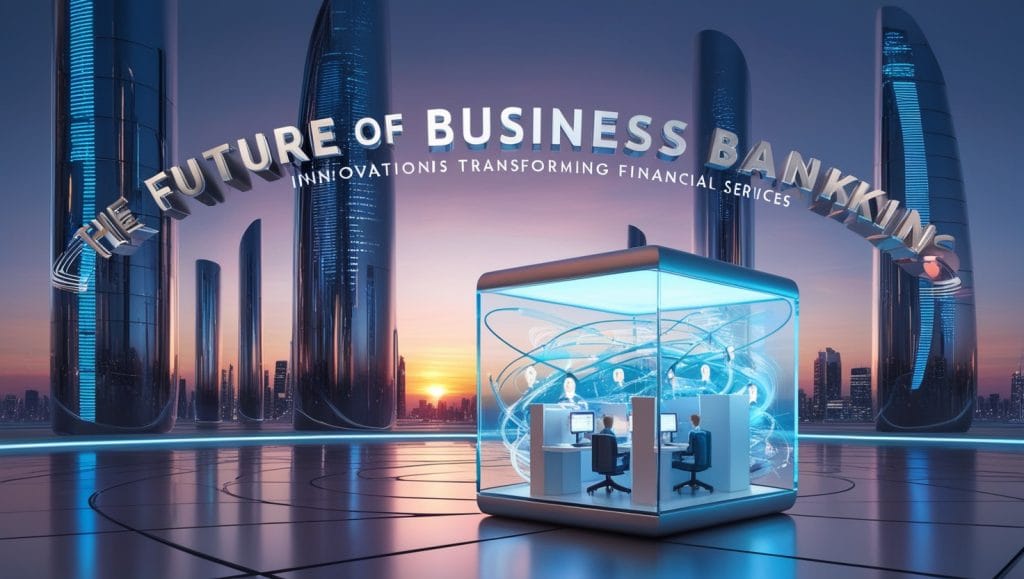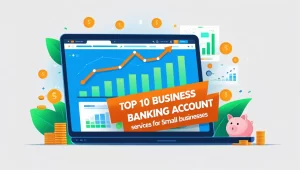The Future of Business Banking: Innovations Transforming Financial Services

The Future of Business Banking: Innovations Transforming Financial Services-The business banking sector is undergoing a profound transformation, driven by technological advancements and evolving customer expectations. In 2024, innovations in digital banking, artificial intelligence (AI), blockchain, and embedded finance are not only reshaping how businesses manage their finances but also creating opportunities for increased efficiency, better customer experiences, and more accessible financial products.
In this article, we’ll explore the key innovations in business banking that are likely to define the future of financial services and help businesses thrive in an increasingly digital world.
1. AI and Automation in Business Banking
Artificial intelligence (AI) is one of the most powerful technologies transforming business banking today. From automating routine tasks to providing predictive insights, AI is helping businesses manage their finances more effectively.
AI-driven Automation is revolutionizing back-office operations. Tasks such as expense tracking, bookkeeping, and fraud detection are being handled more efficiently by AI systems, reducing human error and freeing up time for business owners to focus on growth. For example, AI-powered tools can automatically categorize transactions, generate financial reports, and even assist in preparing tax filings—saving businesses significant time and effort.
Moreover, Predictive Analytics is enabling business banking platforms to provide personalized financial advice. AI algorithms analyze transaction data and market trends to forecast cash flow, identify spending patterns, and suggest ways to optimize expenses. This type of predictive service helps businesses make more informed decisions, particularly around cash flow management and investment planning.
2. Blockchain Technology and Secure Transactions

Blockchain is another cutting-edge innovation with the potential to revolutionize business banking. Known for its decentralized and secure nature, blockchain technology can provide a more transparent, efficient, and secure way for businesses to manage transactions and financial data.
One of the most promising applications of blockchain in business banking is Cross-Border Payments. Traditional methods of transferring money internationally can be slow, expensive, and subject to exchange rate fluctuations. Blockchain-based payment systems, however, can process international payments almost instantly, with minimal fees and no need for intermediaries. This can be particularly beneficial for small and medium-sized businesses that engage in global trade.
Blockchain can also enhance Fraud Prevention and Data Security. With its immutable ledger, blockchain ensures that once a transaction is recorded, it cannot be altered or deleted. This feature significantly reduces the risk of fraud and provides a high level of transparency, making it easier to trace financial transactions and ensure compliance with regulatory standards.
3. Embedded Finance: The Future of Financial Services
Embedded finance is a growing trend that is reshaping the way businesses access and use financial services. It refers to the integration of financial products—such as lending, payments, and insurance—directly into non-financial platforms and services.
For example, an e-commerce platform might offer instant financing options to customers at checkout, or an accounting software could embed a lending product that helps businesses access credit based on their financial data. This allows businesses to get access to the financial services they need without leaving the platforms they use on a daily basis.
This trend is especially valuable for small businesses, which often face challenges in accessing traditional banking services. Embedded lending options, such as invoice financing or short-term loans based on sales data, are providing small business owners with quick, flexible financing solutions without the long application processes of traditional banks.
Payments are also becoming increasingly embedded into various platforms, simplifying transactions. For example, Stripe, a popular payment processing company, enables businesses to accept payments directly within their websites or apps, all without needing a separate payment gateway or bank account. As this trend continues, businesses will have even greater control over their financial services, with seamless access to the tools they need to run day-to-day operations. (Read More: Why Every LLC Needs a Dedicated Business Bank Account in 2024)
4. Digital-First Business Banks and Neobanks

The rise of digital-first business banks and neobanks is another key trend that’s transforming business banking. Unlike traditional banks with physical branches, digital-first platforms offer a fully online banking experience, often at lower fees and with a higher degree of flexibility. These platforms are designed with the needs of modern businesses in mind, providing user-friendly interfaces, fast services, and comprehensive features.
In 2024, small businesses and startups are increasingly turning to neobanks like Revolut, N26, and Chime for their business banking needs. These platforms provide an array of services, including checking accounts, debit cards, international transfers, and expense management tools. They offer benefits such as low-cost international payments, no monthly fees, and real-time tracking of business spending.
The future of digital-first business banks is exciting, as more businesses look to simplify their financial management with banking solutions that are tailored to their specific needs. As these platforms continue to evolve, they will offer even more personalized and innovative features, such as AI-driven financial advice, integrated accounting tools, and easy-to-use expense management software. (Read More: Business Bank Accounts with the Best Perks for Entrepreneurs in 2024)
5. Open Banking and Greater Financial Integration
Open banking is another innovation that is reshaping the future of business banking. It refers to a system in which banks and financial institutions provide third-party providers access to customer financial data (with their consent) through secure APIs (Application Programming Interfaces). This allows businesses to access a wider range of financial products and services from different providers, all through a single platform.
For businesses, open banking offers significant advantages. For example, by integrating their business bank accounts with accounting software, businesses can automate the reconciliation of transactions and gain deeper insights into their financial health. Additionally, businesses can access a wider array of lending options, personalized financing, and even tailored insurance products based on their unique financial data.
Open banking also fosters increased competition in the financial services sector, which means businesses can expect better rates, more innovative services, and a greater focus on customer needs. This shift could lead to a more customized and dynamic business banking ecosystem, where businesses can choose the solutions that best fit their goals. (Read More: Understanding Business Bank Account Fees: What You Need to Know)
6. Sustainable Finance and Green Banking Solutions

With sustainability becoming an increasingly important issue, green banking solutions are gaining popularity, particularly among businesses looking to align their financial practices with environmental goals. These solutions include sustainable loans, green bonds, and investments that support eco-friendly initiatives.
In 2024, more businesses will have access to green financing options, such as loans with lower interest rates for companies that meet certain environmental criteria. For example, businesses that invest in renewable energy or adopt sustainable practices may qualify for lower-cost capital or favorable loan terms. Green banking also includes the development of eco-friendly investment portfolios and funds that are aligned with ESG (Environmental, Social, and Governance) principles.
As businesses are increasingly held accountable for their environmental impact, offering sustainable finance products will become a key part of business banking services, catering to companies that want to make a positive impact while staying competitive in a rapidly changing market.
Conclusion article The Future of Business Banking: Innovations Transforming Financial Services
The future of business banking is bright and filled with transformative innovations that are set to reshape the financial services landscape. From AI-driven automation and blockchain to embedded finance and green banking solutions, businesses will have access to tools that not only simplify financial management but also provide greater flexibility and security. As these technologies continue to evolve, business owners can expect a more integrated, user-friendly, and customized banking experience that helps them scale and thrive in the digital age. In 2024 and beyond, the innovation driving business banking will empower businesses to manage their finances more effectively, reduce costs, and stay ahead of the competition.





